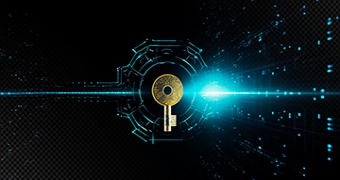We are living in a world where artificial intelligence (AI) is transforming eve....
From Awareness to Action: Celebrating World Water Day

As we celebrate World Water Day on March 22nd, a day dedicated to promoting awareness about the importance of freshwater and advocating for the sustainable management of water resources, it is important to shift our focus from mere awareness to real action.
This serves as a reminder of the pivotal role water plays in our daily lives, the sustainability of our environment, and the vitality of our economies. Water is not just a fundamental human need; it is also a critical component of all socio-economic developments.
Despite its significance, billions of individuals worldwide face water deficiency, with consequences for health, education, and livelihoods. As a matter of fact, as of 2023, 2.2 billion people lack access to safely managed drinking water, including 115 million who rely on surface water.
The 2024 Theme: Leveraging Water for Peace
This year’s theme presents the continuous dedication of the Water Convention towards fostering peace and sustainable development through cross-border water cooperation. By prioritizing collaboration and conflict prevention, it aims to ensure equitable access to water resources for everyone.
Current State of Water Resources
The current state of global water resources presents an alarming reality, with approximately half of the world's population facing severe water scarcity at least part of the year. This crisis is compounded by a multitude of factors, including population growth, climate change, pollution, and inefficient water management practices.
Unsafe water sources contribute to a high number of deaths annually. Diarrheal diseases, ranking as the fifth leading cause of death among children under five globally, stem from various risk factors, including childhood wasting, unsafe water, and inadequate sanitation. The transmission of germs responsible for diarrhea often occurs through contaminated food or water sources, perpetuating the cycle of illness and mortality among vulnerable populations.
Moreover, neglected tropical diseases such as schistosomiasis and trachoma thrive in environments lacking access to safe water, sanitation, and hygiene (WASH) facilities, further worsening the problem of diseases in communities already dealing with poverty.
The impact of water scarcity is particularly acute in regions like sub-Saharan Africa, where women and girls carry the weight, spending an estimated 40 billion hours annually collecting water. This not only perpetuates gender inequalities but also impacts opportunities for education and economic empowerment.
Moreover, the economic consequences of inadequate access to clean water are profound, with every U.S. $1 invested in safe water and sanitation leading to increased economic activity and reduced healthcare costs, which total U.S. $4.3 billion.

To further demonstrate the global water situation, the UN Special Rapporteur on human rights and the environment, David Boyd has reported that “Three quarters of all the natural disasters in the last 20 years were water-related, including floods, landslides and other extreme weather events.” He also proposed five key actions that the United States should take including:
- Prepare a state-of-the-water assessment.
- Conduct a legal mapping initiative.
- Develop water-related plans that incorporate a rights-based approach.
- Implement and enforce water-related laws, regulations, and standards.
- Evaluate progress and, if necessary, strengthen actions to ensure that human rights are fulfilled.
Water Conservation and Management Solutions
Water conservation and management are crucial components of addressing global water scarcity and ensuring sustainable access to clean water for all. Implementing effective strategies is essential to mitigate the impacts of water stress, population growth, and climate change on water resources.
Here are some key solutions for water conservation and management:
- Efficient Irrigation Practices: Adopting drip irrigation, sprinkler systems, and soil moisture sensors can significantly reduce water wastage in agriculture, the largest consumer of freshwater globally.
- Rainwater Harvesting: Collecting and storing rainwater for household use, landscaping, and irrigation helps augment local water supplies and reduces dependence on dwindling groundwater sources.
- Water-Efficient Technologies: Investing in water-efficient appliances, fixtures, and industrial processes can minimize water usage in households, businesses, and industries without compromising performance or productivity.
- Water Recycling and Reuse: Implementing wastewater treatment technologies allows for the safe recycling and reuse of treated wastewater for non-potable purposes, such as irrigation, industrial processes, and groundwater recharge.
- Ecosystem Restoration: Protecting and restoring natural ecosystems, such as wetlands, forests, and watersheds, helps maintain water quality, regulate water flow, and enhance resilience to droughts and floods.
- Sustainable Land Management: Adopting sustainable land-use practices, such as agroforestry, soil conservation, and watershed management, helps reduce soil erosion, improve water retention, and enhance overall ecosystem health.
- Policy and Governance Reforms: Enacting and enforcing water management policies, regulations, and pricing mechanisms that promote equitable access, efficient use, and conservation of water resources is essential at local, national, and international levels.
- Public Awareness and Education: Raising awareness about the importance of water conservation and providing education on water-saving practices empower individuals and communities to take proactive steps in reducing water consumption and protecting water quality.
- Integrated Water Resources Management (IWRM): Adopting an integrated approach to managing water resources considers the interconnectedness of water systems, land use, and socio-economic factors, promoting sustainable development and resilience to water-related challenges.
By implementing these strategies and fostering collaboration among stakeholders, we can effectively conserve and manage water resources, ensuring their availability and quality for future generations while safeguarding ecosystems and supporting sustainable development.
Sustainable Water Practices
While progress is being made, much more needs to be done to ensure universal access to clean water and sustainable water practices. Each one of us can play a role in this collective effort. Individuals can contribute by adopting water-saving habits in their daily lives, such as:
- Fix Leaks: Regularly check faucets, pipes, and toilets for leaks, and promptly repair any leaks found.
- Use Water-Efficient Appliances: Replace old appliances with water-efficient models, such as low-flow toilets, showerheads, and washing machines.
- Reduce Water Consumption: Practice mindful water usage by taking shorter showers, turning off the tap while brushing teeth or washing dishes, and reusing water where possible.
- Advocate for Better Policies: Join local advocacy groups and campaigns to support sustainable water practices and stricter regulations on water usage and pollution.
- Invest in Local Infrastructure: Support local water infrastructure projects through donations, volunteering, or participating in community initiatives.
- Educate Others: Spread the word about sustainable water practices to raise awareness. Share information on social media or at community events and encourage others to take action.
- Engage with Government Representatives: Contact your government representatives to support water conservation and urge sustainable management.
Communities can advocate for better water management policies and invest in local water infrastructure projects. Governments must prioritize water conservation and allocate resources toward sustainable water management initiatives.
Five Common Misconceptions about Water
Some of the most common misconceptions related to water include:
-
Earth has an unlimited supply of water
Although Earth is called the "blue planet" due to its water abundance, only 1% of it is easily accessible for human use. The rest is saltwater in oceans or polar ice caps and glaciers. This limited freshwater resource needs careful management to ensure sustainable access for all.
-
People who consume dirty water develop immunity
Although the human body can partly develop immunity and become resistant to some agents found in contaminated water, many of them will seriously harm people’s health. Drinking contaminated water can lead to long-term health issues, even if immediate symptoms are not apparent. Chronic exposure to contaminants such as heavy metals, chemicals, and microbial toxins can result in serious health problems, including neurological disorders, organ damage, and various cancers.
-
Water scarcity only affects dryer regions
While dryer regions are indeed more vulnerable to water scarcity, it is a global issue. Factors such as population growth, pollution, climate change, and inefficient water management contribute to water scarcity in regions across the globe, including some traditionally water-rich areas.
-
Drinking water increases water retention
Drinking water does not cause water retention. On the contrary, staying hydrated helps maintain the body's fluid balance, which can actually reduce water retention. When the body is dehydrated, it tends to retain water in an attempt to prevent further water loss, therefore, adequate hydration is essential for promoting healthy fluid balance and minimizing water retention.
-
Individuals cannot make a difference in water conservation
Every individual can contribute to water conservation through simple actions such as fixing leaks, reducing water waste, using water-efficient appliances, and being mindful of consumption habits. Collectively, these small efforts can make a significant impact on preserving water resources.
ISO Standards and Sustainable Water Management
ISO standards play a crucial role in ensuring sustainable water management practices across various sectors. Here is how some key ISO standards, including ISO 9001, ISO 14001, ISO 22000, and ISO/IEC 27001, are related to water:
-
ISO 9001: Quality Management Systems (QMS)
ISO 9001 provides a framework for organizations to establish, implement, maintain, and continually improve quality management systems. While ISO 9001 does not specifically address water management, organizations within the water sector, such as water utilities or water treatment facilities, can use ISO 9001 to enhance the quality of their products and services related to water supply, treatment, and distribution.
-
ISO 14001: Environmental Management Systems (EMS)
ISO 14001 sets out requirements for establishing and maintaining environmental management systems. For organizations involved in water-related activities, such as wastewater treatment plants or water-intensive industries, ISO 14001 helps identify and manage environmental aspects and impacts associated with water use, pollution prevention, and resource conservation. It encourages the adoption of sustainable practices to minimize environmental harm and improve water quality.
-
ISO 22000: Food Safety Management Systems (FSMS)
ISO 22000 specifies requirements for food safety management systems, focusing on ensuring the safety of food products throughout the supply chain. Water plays a critical role in food production and processing, making it essential for organizations to manage water quality and sanitation to prevent contamination. ISO 22000 helps food-related businesses, including agricultural producers, processors, and distributors, establish control measures to ensure the safety and integrity of water used in food production.
-
ISO/IEC 27001: Information Security Management Systems (ISMS)
While not directly related to water management, ISO/IEC 27001 provides a systematic approach to managing information security risks. In the context of water utilities or organizations handling sensitive water-related data, such as customer information or infrastructure plans, ISO/IEC 27001 helps safeguard against cybersecurity threats, ensuring the confidentiality, integrity, and availability of critical information and data systems.
In conclusion, as we celebrate World Water Day, it is evident that water is more than just a basic necessity. It is essential for maintaining good health, promoting prosperity, and ensuring peace.
The theme for 2024, "Leveraging Water for Peace," emphasizes the importance of working together to ensure fair access to this vital resource. Although there are some challenges, we have hope in solutions such as efficient irrigation and policy reforms that can contribute to a sustainable future. By prioritizing conservation and cooperation, we can ensure that water is available for the well-being of both current and future generations.
About the Author
Vlerë Hyseni is the Digital Content Specialist at PECB. She is in charge of doing research, creating, and developing digital content for a variety of industries. If you have any questions, please do not hesitate to contact her at: content@pecb.com.


